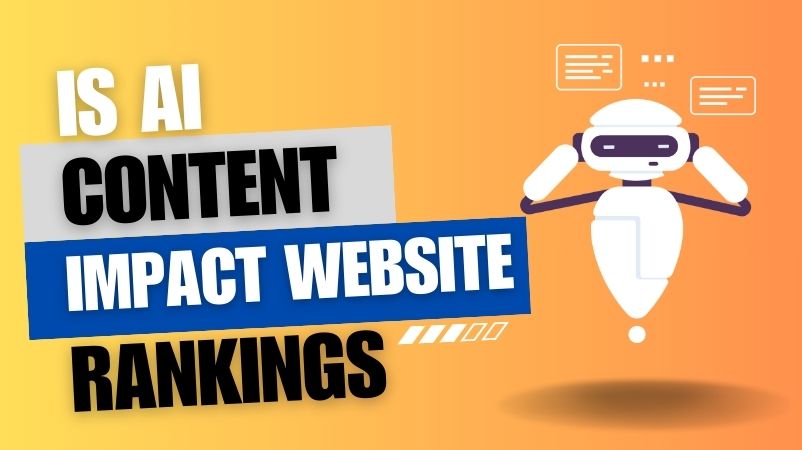
The buzz is “Can I create SEO content using AI?”, “Does Google Penalize AI Content?”, “Will my AI content rank on Google?”.
All of these queries will be addressed in this post.
Before that, as technologies advanced, content creation methods as well evolved. And, now Google gives importance to content intent and principles rather than the process of how the content is created.
Google uses algorithms to determine its rankings. However, Google guidelines clarify claims around AI-generated content that Google isn’t against AI-generated content.
Let’s discuss further.
What is AI generated Content?
Artificial Intelligence generated content means using machine learning to structure and deliver the information to the user.
Existing data, information and other learning patterns are provided to algorithms to produce new content as humans create.
Although many of us understand and utilize the automated tools often, AI generated content is next level.
The generated content has greater quality and it is quickly becoming more accessible than people expected.
And, there are various companies and businesses providing access to AI generated content.
What is the Google approach to AI generated Content?
Google’s approach is to focus on the quality of the content rather than the production technique. Google rewards quality content regardless of production method and continues with its ranking system.
So, ask “Is Google against the AI generated Content?”. No, Google isn’t interested in whether you develop your content using AI. They are solely interested in quality content.
When you’re utilizing the technology trends and creating your content, it doesn’t lose all your ranking.
The ranking factors for AI-generated content are the same as those for regular content as Google emphasizes the authority, the quality of the content, the links to it and the relevancy of the material to the user’s search query.
In short, AI generated content should meet Google’s quality guidelines.
So, what is E-E-A-T?
The recent helpful content updates released in December says that Google mainly focuses on E-E-A-T. It means Expertise, Experience, Authoritative and Trustworthiness as a metrics to determine the credibility of your page even if you’re using AI generated content.
Experience:
Someone with experience in that subject will likely provide the most helpful guidance.
Expertise:
The author shows the education or qualifications required to offer reliable information. This is what Google refers to the YMYL (Your Money Your Life) category, which includes websites for financial security, health care, law, and news. Due to the serious implications that might result from irrelevant or poor content, they held these categories higher.
Authority:
The objective of Google is to present content from reliable, reputable sources. A website might be credible when there are backlinks from other trustworthy sites and external links to reliable sources in your content. These are both effective ways to build authority.
Trust:
It must answer to do you usually provide accurate information? Is your website secure?
You must re-evaluate AI content based on your pages and the content’s credibility.
Google Guidelines: Who, How and Why
Google provides a set of guidelines to help site owners and SEOs in creating better content.
Even if it is human written or AI content, it must satisfy the four E-E-A-T standards areas. Also, to evaluate the AI content, follow these three things: Who, Why and How.
1. Who created the content?
The excellent method is to reveal the author or writer of the content.
For instance, adding an author bio. Google acknowledges it is the best method to find who wrote the article and answer why readers must listen to you.
2. How was the content created?
Consider a product review as an example. In this case, emphasizing how this information was produced (through direct reviews from the customers).
It would be beneficial because it would indicate experience.
If AI is utilized to produce content, explaining why doing so was effective would be beneficial. This question can also help you determine whether you’re utilizing AI to raise the standard of your content.
3. Why this content was created?
Most information is produced to help users in problem-solving.
It might be anything like how-to or searching for a solution. It should be simple to respond to the why.
Your answers from AI content should still be to assist your users/readers. The content may not rank well if it doesn’t put the reader’s needs first.
If your answer seems to rank on Google, it is a red signal that your contents need to be reviewed. And it is a violation of spam policy.
Is it possible for Google to detect AI content?
Google can easily identify AI-generated content since they permit it.
Google uses a range of methods, such as natural language processing (NLP) algorithms that examine the contents for patterns and syntax characteristic of computer-produced writing, to recognise and highlight content generated using AI tool.
Secondly, there are major risks to publishing unedited AI content.
It examines text for abnormal patterns and overuse of particular words or phrases.
For instance, the Google Algorithm may raise a risk sign if the content contains excessive keywords or repetitive sentences. This could result in penalties.
AI lacks creativity and originality. To make the content sound natural, various approaches like templates or particular language patterns are used.
However, Google can spot these patterns through content analysis of different sources.
Then, How can AI be used to create content for SEO?
Think about these suggestions if you choose to use AI-generated content.
● Let AI highlight the keywords relevant to your niche and use them to improve your SEO and develop content focused on it.
● Use an AI generator to produce outlines your human writers can work with. This lessens the issue of content that is lacking human touch and creativity and it also speeds up the creation of content.
● Before posting or publishing, the first thing you should do is edit and proofread. Check the content for accuracy, grammatical mistakes, and readability.
However, it is advisable to avoid depending entirely on AI content.
How to See the Content Generated by ChatGPT?
On November 30 ,2022, the new OpenAI ChatGPT was introduced and created chaos in the media. The software helps to produce the auto-genreated content using a unique code. And it can create content for websites, blogs, online ads, copywriting, marketing, and academic projects.
Critics state that this AI-content production technology encourages students to commit fraud, behave confrontational when questioned, and spreads a lot of misleading information.
The OpenAI also acknowledges the faults and defects in the systems, like
● Responding to adverse instruction
● Shows biased behavior
● Produces unsafe content
● Need to decline of pointless request
This implies the use of ChatGPT comes with various high red-alerted consequences.
How does Google Recognise Chat GPT?
Google is aware of the issues with ChatGPT and creation of AI contents.
Its systems exclusively look for “high-quality information” and ignore contradicting data on important topics.
The E-E-A-T standards will fail with unreliable content. Spam Brain, a feature of Google, will find spam.
Google will only give high search rankings to information which are beneficial, unique and satisfies aspects of E-E-A-T.
Google reveals making it apparent to readers what role AI-generated content played in the writing process.
Pros and Cons of AI generated Content:
1. Increase content creation’s effectiveness and speed. Also, you must be concerned about the threat of creating spammy or poor-quality content.
2. Save both time and resources when producing high-quality content. However, the readers look for the article with human interaction and innovation.
3. AI may produce text, image, audio, and video information.
4. To increase content relevance and engagement, customized AI content is available that fit needs and preferences. In contrast, if search results are manipulated, a site’s reputation suffers, and Google may impose penalties.
When Does Google Penalize AI Generated Content?
Google clarifies that AI generated Content also ranks in Google search engine. However, the limitations are that the site follows Google Search standards, if not there are possibilities AI content may get penalized.
On what factors AI- Content can be penalized,
● Duplicate: When content is not unique, already existing in any other sites can be penalized as the user fails to get a uniqueness of the content.
● Doorway pages: Sites designed mainly for Google are considered low-quality pages that use AI to create enormous content just for SEO.
● Poor quality content: The content is written by humans or AI, if that doesn’t provide accurate or poor written content. Then, Google penalizes unreliable content.
● Cloaking: When the user views content differs from the crawled content. It is a black Hat SEO technique.
● Spam: Content produced only for the purpose of influencing search results.
Keep in mind that these factors cover not every content created by AI. By employing any of these strategies, you run the risk of being restricted by Google.
In the end, the usage of AI-generated content is acceptable as long as it complies to quality standards and E-E-A-T principles. AI-generated content can be useful and deliver value for the audience when they are targeting with the appropriate strategy.

Factsinsight.com is a leading blog that focuses on creating high quality, interesting and useful content about technology. We are a group of experienced writers who know a lot about the world of tech and love to stay abreast of the latest trends and developments. Our aim is to give useful and real knowledge to our people.
